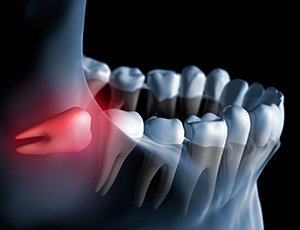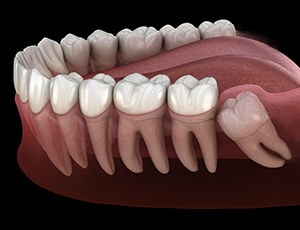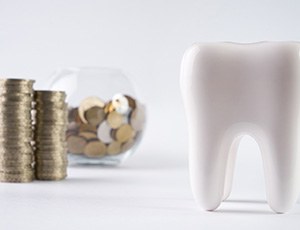Wisdom Tooth Extractions – Carrollton, TX
Adding Space to Your Smile
Wisdom teeth are also referred to as third molars, and they are not necessary for food consumption anymore. In fact, they can actually be harmful to your oral health and overall well-being. Known to erupt during late adolescence or early adulthood, these teeth tend to cause much pain, resulting in patients requiring wisdom tooth extractions in Carrollton. At Epic Family Dentistry, our team is here to deliver the exceptional care individuals need to avoid continued discomfort and instead embrace healthier smiles. Call us if your wisdom teeth are beginning to erupt.
Why Choose Epic Family Dentistry for Wisdom Tooth Extractions?
- Dental Insurance Welcome
- Dentist with Specialized Training to Ensure Comfort & Safety
- Sedation Dentistry Available
What Are Wisdom Teeth?

Wisdom teeth are those that form toward the back of the mouth and were once necessary for early civilizations to consume coarser, denser foods like wild game. As time passed and changes to diets and human facial structure occurred, these teeth became more of a nuisance because of the lack of space inside the mouth.
Often, they erupt when a patient is between the ages of 16 and 25, but not all individuals experience difficulties. Some wisdom teeth erupt with no issues; however, for most, removing them is necessary, especially if potential infection or damage is a likely risk.
Why Do Wisdom Teeth Need to Be Removed?

Wisdom teeth do not always need to be removed. Some erupt through the gumline and have ample space, so they don’t press onto nearby teeth. But for those who are not so lucky, a dentist may recommend tooth removal for one of the following reasons:
- An infection is forming that puts nearby healthy teeth at risk for damage
- A cyst forms near the wisdom tooth
- These teeth are impacted beneath the gumline and press against healthy teeth (when impacted, these teeth tend to be at an angle)
- Wisdom teeth have partially erupted and made it difficult to maintain good oral hygiene
What to Expect From the Wisdom Teeth Procedure

How a person’s wisdom teeth erupt will determine how they should be removed. During a consultation with our team, we will examine a person’s mouth using X-rays and other diagnostic imaging techniques. This will help us to get a closer look at the positioning of the wisdom teeth and how best to approach their removal.
If wisdom teeth have partially erupted, we can use specialized instruments that are designed to lift and gently loosen each tooth until they detach fully from their sockets. If impaction is the reality, these teeth will be removed carefully as part of a surgical procedure. Incisions will be made to access each tooth, removing them in sections to avoid damaging the bone.
Recovering From Wisdom Teeth Extraction

There are several steps a person must take after undergoing wisdom teeth extraction. It is strongly encouraged that individuals abide by the instructions provided to avoid the potential for a dry socket or other potential complications (i.e., increased pain, swelling, bleeding, etc.).
Some key tips to remember include:
- Using a cold compress to reduce inflammation and discomfort
- Applying gauze to the surgical sites to try and reduce bleeding and encourage blood clots
- Avoiding straws and vigorous rinses, as too much pressure can result in dry sockets
- Waiting to engage in any kind of strenuous activity for at least the first week
- Not practicing unhealthy habits such as smoking or consuming excessive amounts of alcohol
- Getting plenty of rest the day of the procedure
- Taking necessary medications prescribed by a dentist or those that are over the counter
Understanding the Cost of Wisdom Tooth Extractions

Tooth extractions can make patients a little bit nervous, which is why we do what we can to make sure that paying for your dental care doesn’t contribute to their concerns. When we meet you for your consultation, we’ll be sure to give you a sense of what your treatment is going to cost and the options available to you to make your care more affordable.
Until we can meet you in person, here’s what you should know about what your wisdom tooth extraction is going to cost you.
Factors That Can Impact the Cost of Wisdom Tooth Extractions

Unfortunately, it isn’t easy to tell you exactly what your wisdom tooth extraction is going to cost without meeting you first. This is because there are several factors that can complicate the procedure and will therefore affect what it costs.
First of all, not everyone is born with all four wisdom teeth, and the fewer you need to have removed the more affordable your procedure will be. On the other hand, some wisdom teeth become impacted, i.e., they fail to emerge completely from below the gumline. There are soft-tissue impactions, where a wisdom tooth has partially emerged from the gums, and the more difficult bony impactions, where the tooth is lodged in the jaw itself. The latter will almost always involve oral surgery, which means that we’ll need to connect you with an oral surgeon who will have their own rates for dental care.
It's also important to consider whether you’re going to receive sedation during your procedure and factor its cost into the price of treatment as well.
Does Dental Insurance Cover Wisdom Tooth Extractions?

While oral surgery isn’t always covered by dental insurance, most plans will have a provision for wisdom tooth extractions. This of course depends on whether you’ve met your deductible or if you’ve exceeded your yearly maximum; you should check with your dental plan to make sure that you’re getting the most out of your benefits. Of course, we’ll be happy to help you file paperwork, make calls, and facilitate this process for you.
Other Options for Making Wisdom Tooth Extractions Affordable

We want wisdom tooth removal to be affordable for all of our patients, even those who don’t have insurance. For that reason, we do everything that we can to offer alternatives that can make our services fit your budget.
We frequently work with CareCredit, which can allow patients to divide the cost of their treatment across several months. This plan offers low-to-no interest financing plans for patients who qualify based on a credit check.
If you want to learn more about how you can make your wisdom tooth extraction budget-friendly, feel free to reach out to us for a consultation today!
Wisdom Tooth Extractions FAQs
Why Do We Have Wisdom Teeth?
These days, most of us don’t need our wisdom teeth – but our ancestors benefitted greatly from having these extra molars! Since early humans subsisted on a diet of raw foods, including uncooked meat, berries, nuts, roots, and leaves, they didn’t cut up their food or cook it in the same manner we do. These tough, coarser diets required a broader jaw and stronger molars, and experts believe this is why wisdom teeth developed. Today, we soften, tenderize, or cut up nearly every type of food we eat, meaning the teeth are no longer necessary and our mouths normally don’t have the extra space for them.
How Long Does Wisdom Tooth Surgery Take?
It’s worth noting that regardless of how long your wisdom tooth surgery takes, due to the effects of the sedation, you’ll feel as if barely any time has passed at all. But on average, the procedure goes by fast; each tooth takes about 15 or 20 minutes to be extracted, so removing all 4 can take about an hour and a half or longer. This also depends on the complexity of the case – teeth that are majorly impacted might take longer to remove. We’ll be sure to give you an estimate of how long the procedure will take before we get started.
Is Wisdom Tooth Removal Painful?
The very first step of wisdom tooth surgery is always numbing your mouth with a local anesthetic, meaning you won’t feel any outright pain at all during the procedure. You’ll also most likely be sedated, which limits your body’s ability to register pain. It’s not uncommon for patients to feel some slight pressure as their teeth are gently rocked back and forth, but this isn’t anything you should worry about! Some general discomfort and soreness are expected following the procedure, but assuming you follow your aftercare guidelines closely, this is easily manageable.
How Should I Prepare for My Wisdom Tooth Extraction?
Before your procedure, don’t hesitate to ask us any questions you have, no matter how minor they may seem. We’ll give you specific guidance on what to do before your surgery, but some other tips include:
- Arrange for someone to drive you to and from the office, since you won’t be fit to drive after receiving sedation or anesthesia.
- Wear loose, comfortable clothing to your appointment, or a shirt with sleeves that are easy to roll up.
- Stock up on soft foods at home to eat for the next few days.
- Do not smoke for at least 12 hours before the procedure.
